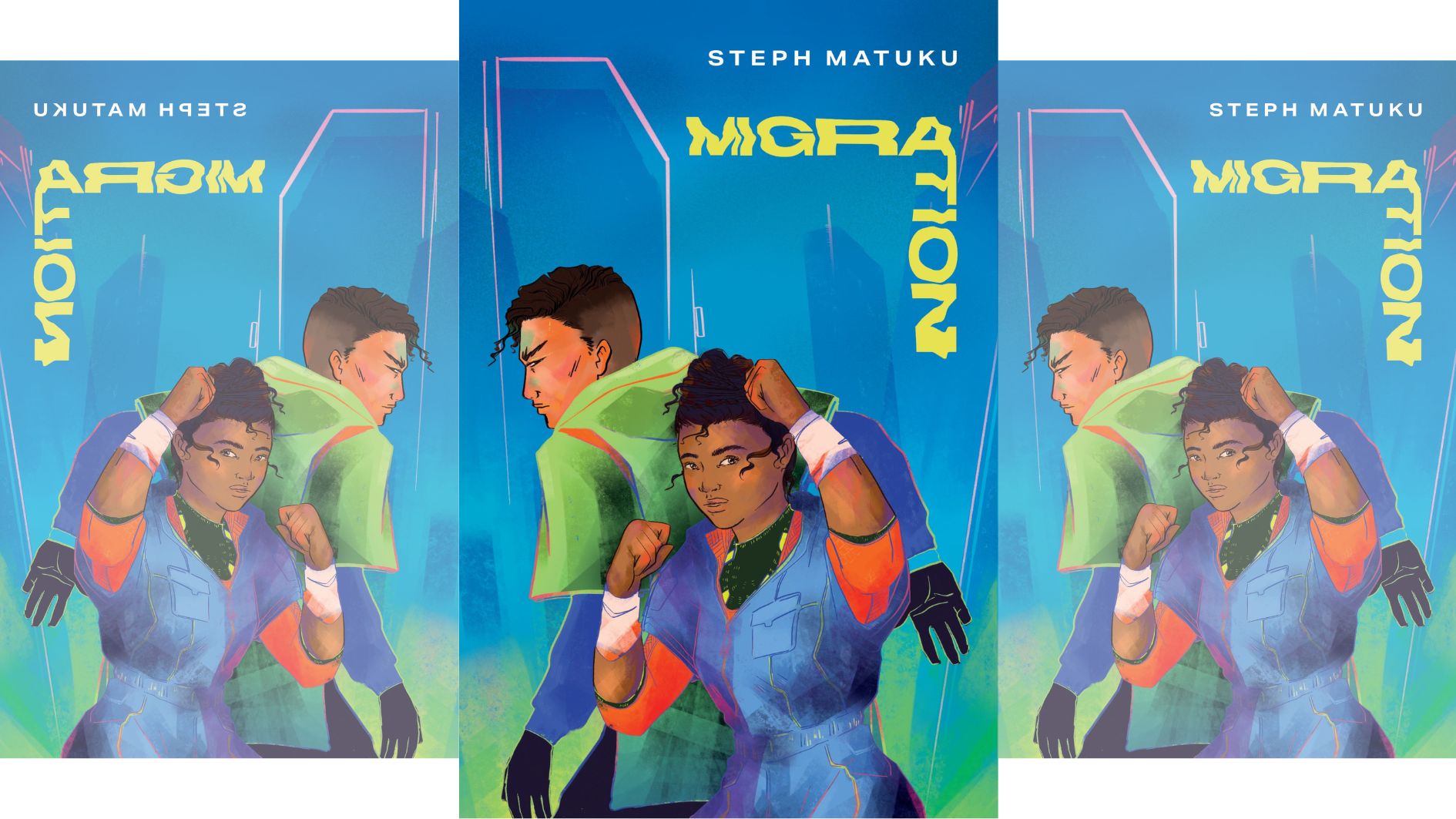Steph Matuku’s latest YA novel grapples with themes of enforced migration, loss, societal expectations, and coloniser violence. Ceridwyn Roberts describes it as ‘unputdownable’, a match for The Hunger Games, and better than other series.

I always hesitate to call a book ‘unputdownable’ but Steph Matuku’s Migration honestly didn’t leave my hands from the first page to the last. While it brings together tropes from many young adult novels, it is entirely its own in setting, spirituality, action, and ideas. Themes that echo throughout include enforced migration, unexpected loss, rising beyond what society expects of you, and coloniser violence.
A warning here, if a kid can deal with The Hunger Games, they can deal with this book, but it does deal with death and violence—a lot of it.
The novel begins with a prologue of enslaved people escaping from their cruel captors through a portal to another world. When the story starts, 3,000 years later, the young people who powered the portal are seen as gods in the new civilisation. While never explicit, it’s clear that te ao Māori is a key reference point, with kete, ngāti and wānanga all represented in the text.
Migration honestly didn’t leave my hands from the first page to the last.
The plot involves the protagonist, Farah, joining a boarding school-style wānanga that trains fighters, strategic thinkers and military personnel. Joining the wānanga means Farah escapes her māmā who wants to push her into an advantageous ‘alliance’ with someone from another ‘upper’ echelon ngāti.
The wānanga pupils are split into combatants (fighters) paired with intuitives—people who can, with training, predict what is about to happen (officially up to about seven seconds ahead). In training, video games come to life in a slightly less bloodthirsty way than they do in The Hunger Games. Mind-merging headsets allow intuitives to instruct their combatants by giving them warning of what’s about to happen. The equivalent of Pacific Rim-style “drift” compatibility decides who partners with who. Unfortunately, the group joining the wānanga with Farah are going to have to deal with far more than just training exercises…
It’s an exciting novel where the action doesn’t stop, and builds in intensity.
All the usual characters in boarding school novels are there—the jealous, bitchy girl; the happy-go-lucky bigmouth; the fun friend, and of course, the prickly love interest. My only, very small, criticism is that the intensity and packed nature of the plot mean that the characters are sometimes a little shallow. The relationships are there but only a few have real depth.
The theme of history repeating itself is the foundation of Migration. It permeates every element, from the importance of understanding the impact the past has on the future to short moments of déjà vu, from the intuition used in countering fight moves to disturbing spiritual premonitions. Matuku’s prose brings it all together beautifully into a densely plotted, action-heavy, constantly interesting book.
It’s well and truly a match for The Hunger Games, leaves The Maze Runner for dust, and makes Ender’s Game look well and truly boring.
This is definitely a book that will be gobbled up by teenagers, and rightly so. It also goes deep enough that English teachers and librarians are going to want to stock the shelves and set essay questions that kids will happily delve into. It’s an exciting novel where the action doesn’t stop, and builds in intensity. It starts with wanting to put one over on a school rival, and ends up taking on world-ending significance. I wholeheartedly give Migration 4.5 out of 5 stars and recommend it for any teenager (or teen-at-heart) who likes viscerally-described action, great world building, interesting spirituality, and fascinating real world parallels. It’s well and truly a match for The Hunger Games, leaves The Maze Runner for dust, and makes Ender’s Game look well and truly boring. Best of all, it was written in Aotearoa and demonstrates exactly how strong our country’s writing game is.

Ceridwyn Roberts
Ceridwyn Roberts grew up surrounded by people who loved science but has spent her entire life consumed by fiction and dying for the stage (figuratively, you understand). Her passion for communication, as a writer, actor, director, and journalist has finally collided with her early influences, and she is now a freelance science communicator. Ceridwyn bounces (mostly) professionally between eclectic topics including climate science, biodiversity, energy, engineering, and economic policy. She has written several unpublished novels that she knows the problems with but has no energy to fix. She is slowly recovering from a proximity-caused over-reliance on the passive tense.



